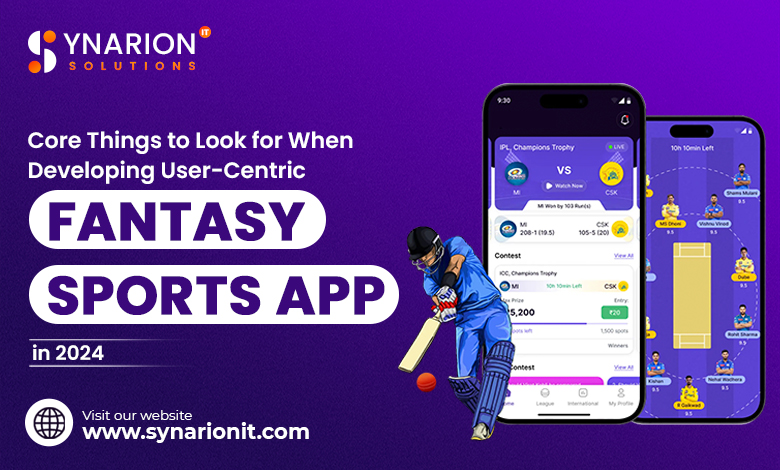Introduction
In recent years, the popularity of fantasy sports has skyrocketed, transforming the way fans engage with their favorite sports. As the landscape continues to evolve, developing a user-centric fantasy sports app has become more crucial than ever. For developers and businesses venturing into this domain, understanding the key components of a successful app is essential. This guide outlines core considerations for fantasy sports app development in 2024, helping you create a platform that not only meets user expectations but also fosters a loyal user base.
User Experience (UX) Design
User experience should be the cornerstone of your fantasy sports app development. An intuitive and engaging interface is essential for retaining users. Consider the following elements:
- Intuitive Navigation: Ensure that users can easily navigate through the app. Utilize a clean layout with easily identifiable icons and menus.
- Onboarding Process: Create a seamless onboarding experience that guides new users through the app’s features. This can include tutorial videos or interactive guides.
- Visual Appeal: Use vibrant graphics and animations that resonate with sports enthusiasts. The aesthetic should align with the theme of the respective sport while maintaining usability.
Personalization Features
Personalization is a significant trend in 2024, especially in fantasy sports. Users want to feel that the app caters to their unique preferences. Implement features such as:
- Customizable Profiles: Allow users to create profiles that reflect their favorite teams, players, and leagues. This customization enhances engagement.
- Tailored Notifications: Provide users with the option to receive notifications about player performance, injury updates, and team news based on their selected interests.
- Dynamic Content: Use algorithms to suggest articles, tips, and game strategies that align with the user’s fantasy team and league activity.
Social Integration
The social aspect of fantasy sports is a vital component that drives user engagement. Incorporate features that facilitate community interaction:
- League Creation and Management: Allow users to create private leagues with friends, enhancing competition and camaraderie.
- Social Sharing: Enable users to share their achievements, team selections, and league standings on social media platforms, fostering a sense of community.
- In-App Chat: Implement a chat feature that allows users to communicate within leagues, discuss strategies, or celebrate victories.
Data Analytics and Insights
In fantasy sports, information is power. Providing users with robust data analytics can significantly enhance their gameplay experience:
- Player Statistics: Offer comprehensive stats, historical performance data, and predictive analytics to help users make informed decisions.
- Real-Time Updates: Ensure that your app provides real-time data updates, including player injuries, team news, and game scores, so users can adjust their strategies promptly.
- Visualization Tools: Use graphs and charts to display player performance trends, allowing users to analyze data easily.
Robust Security Features
With increased user engagement comes the responsibility of ensuring user data security. Prioritize the following security features in your fantasy sports app development:
- Data Encryption: Implement strong encryption protocols to protect user data, including personal information and payment details.
- Secure Payment Processing: Partner with reputable payment processors to ensure secure transactions, allowing users to focus on gameplay without worrying about financial safety.
- Two-Factor Authentication (2FA): Add an extra layer of security with 2FA, giving users peace of mind when accessing their accounts.
Scalability and Performance
As your user base grows, your app must be able to handle increased traffic without compromising performance:
- Cloud Infrastructure: Consider using cloud services for scalability. This allows your app to adapt to varying loads, ensuring a smooth user experience.
- Regular Updates: Continuously monitor app performance and implement updates to fix bugs, enhance speed, and introduce new features based on user feedback.
- Load Testing: Before launching, conduct thorough load testing to identify potential bottlenecks and ensure the app can handle peak usage times.
Monetization Strategies
While building a user-centric app is paramount, a sustainable monetization strategy is also essential. Explore various options:
- Freemium Model: Offer a free version of the app with limited features and a premium subscription for additional benefits, such as advanced analytics or ad-free experiences.
- Advertising Partnerships: Collaborate with brands for targeted advertisements, ensuring they are relevant to your audience to maintain user engagement.
- In-App Purchases: Provide users with the option to purchase virtual goods or enhancements that can improve their gameplay experience.
Compliance and Regulations
With the rise of fantasy sports, regulations are becoming increasingly important. Ensure that your fantasy sports app complies with relevant laws and regulations:
- Age Restrictions: Implement age verification mechanisms to prevent underage users from participating.
- Data Privacy Laws: Familiarize yourself with data privacy regulations, such as GDPR and CCPA, to ensure compliance and protect user data.
Conclusion
Developing a user-centric fantasy sports app in 2024 involves a multifaceted approach that prioritizes user experience, personalization, social interaction, and robust data analytics. By partnering with a reputable fantasy sports app development company, you can leverage their expertise to create a platform that not only meets the needs of today’s sports enthusiasts but also positions you for future growth. Keep these core considerations in mind to ensure your app stands out in the competitive fantasy sports market and continues to engage users effectively.



